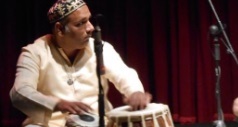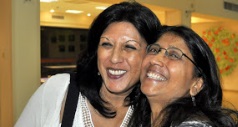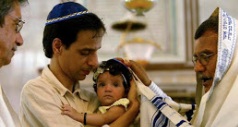A Girl from My Hometown - by Sophie Judah
Gershon looked at the list of names on his desk. He pursed his lips in irritation. An Indian family had been allotted to him
once again. His job with the Ministry of Immigrant Absorption in Haifa entailed work with immigrant families. He helped them adjust to life in the new land by helping them find jobs, informing them about their rights as immigrants to tax deductions and health care, and getting them an apartment from the Ministry of Housing. He also helped them with money until they found jobs. Because he was Indian by origin, he usually ended up caring for Indian immigrants. The anxious newcomers always felt better when they were matched with somebody who understood their language and culture. Gershon, however, was not too pleased about this because he found that the Indian immigrants regarded him as “one of our own” and made demands on him that they would never have dreamed of making on another petty government
official who came from a different background. He tried to be as fair as possible and treat all immigrants equally, but his former countrymen behaved as though he had a special obligation to them. When he pointed out that he could not favor them over others, they usually accused him of forgetting his origins and being willing to sacrifice “his people” in order to further his career. Gershon could not possibly be pleased that another Indian family was waiting outside his office.
“Come in,” Gershon said in response to the timid knock on the door. He busied himself with some papers on his desk. “Sit down,” he said, pointing to the chairs but keeping his head down. He looked up only when he felt that the family was seated and looking at him in expectation. As soon as he raised his head, he heard a woman gasp.
“Ching!” she exclaimed. Gershon was startled. He was called by this name only by people he had known in childhood. His older siblings had decided that his chubby cheeks gave his eyes a Mongolian look, so they had taken to calling him by a Chinese name. Gershon’s baby fat had melted away as he grew older, but, in Jwalanagar, anyway, the name stuck to him.
Gershon looked at the lady but did not recognize her. He had left Jwalanagar soon after Israel became a state—thirty years ago. People had grown up and changed. If he could not recognize her, he was not really to blame. At least that was what he told himself as he tried to compare the face in front of him with the ones in his memory.
“Don’t you remember me?”
Oh, boy! Another person who will make demands on me and all the spare time I’ve got, Gershon thought. He stole a look at the names on the list in front of him. It said only, “Family Dandekar.” This was of no help when Gershon needed the lady’s first name.
“I’m Esther. Esther Moses. Don’t you remember?”
Gershon was surprised, but if he gasped, he did so silently. Esther had changed. He tried to compare the aging, careworn face before him with the one in his memory, but he discovered that because he had not thought of her for so long the picture in his mind had faded beyond recognition. All he remembered was curly hair that refused to grow beyond shoulder length, a fiery temper, dark eyes, and a slightly upturned nose. He should have remembered more about Esther, but all he could recall were the arguments he’d had with other people in Jwalanagar because of her. She was the girl his parents had chosen to be his bride. Gershon had agreed to the match. Esther was what in Jwalanagar was called his cousin twice removed. This meant that their parents were cousins. Their grandmothers, Elisheva and Ketura, were sisters.
His grandfather Joseph and her grandfather Bentzion had always been good friends. As a result, Gershon and Esther had
practically grown up together. In spite of this, Gershon had never given her much thought. His parents had suggested that he marry her, and he found no reason to reject their choice. After they became engaged he found himself thinking of her often and convinced himself that the tender thoughts were love. He was also sure that she returned his love because she grew shy in his presence, blushed, and found speech difficult. The wedding date had been set for August, before the Selichot, the prayers of repentance said during the month prior to the Jewish New Year, began.
Trouble for the couple started at a housewarming party given by Mr. and Mrs. Nissim Isaac. At the time there were fourteen Jewish families in town, and the whole community was invited. After prayers and dinner Mr. Solomon turned to Gershon and began to tease him.
“Next housewarming will be yours, eh? I know that you will give us as good a meal as this one, because the Bene Israel women always whip up a fantastic dinner when they get together. I can’t wait to taste your grandma Elisheva’s saandans once again.”
Gershon was expected to be embarrassed and bashful about his upcoming wedding. Everybody turned to him with smiles on their faces. But he surprised them all when he said, “I shall have no housewarming. I intend to leave for Israel a few days after the wedding.”
There was a stunned silence for a few moments, and then it seemed as though everybody started to talk at the same time.
“Your parents did not tell me that when they asked for my daughter’s hand on your behalf,” Esther’s father said.
“They did not know of my decision,” Gershon replied.
“I will have you understand, young man, that I do not intend to give my daughter to a man who will take her far away from me.”
“Any man she marries will take her away from you,” Gershon said. “Once a girl marries she belongs to her husband’s family, and not to her parents. That is the way of the world.”
“You are right. Still, a father wants to know when his daughter is well, when she is sick, and whether she is happy or unhappy,” Nissim Moses had insisted.
“There are things called letters. Besides that, you must have had some faith in me when you gave your word to my parents and grandparents.”
Mr. Moses fell silent, and Mr. Isaac, who was seated beside him, tactfully changed the subject.
Esther had been seated too far away to hear what passed between the men. She remained ignorant of his decision until
she returned home. Gershon did not know what she said or how she reacted, but he began to be visited by messengers who acted like lawyers pleading her case. Not only did she not want to go, she also tried to get them to convince him to change his mind about going.
The evening after the housewarming Esther’s father came over to Gershon’s house to have a serious talk with him. He spoke about a son’s duty to his parents. Children were not supposed to abandon their parents in their old age. What would happen to the old people if all the young men and women left them and went to Israel? He quoted passages from the Bible and other holy texts to make his point.
Gershon used the same text against him. “The Torah asks us to honor our parents. It is in honor of what they have taught us that I want to leave. They have taught us to love Israel and pray for her and her prosperity. We even pray for rain or dew in seasons that are suitable for the land of Israel and not the land we are living in.”
“You are like the devil quoting the Scriptures. Who do you think you are? The prophet Moses? Are you going to lead an exodus? Already one of my sons and two daughters want to leave like you. What will I do without my children?”
“You could come, too,” Gershon said.
“Are you crazy? Do you expect me to give up my job and my home just to go there and starve? Israel is a small place surrounded by millions of Arabs who do not want the Jews there. Do you think that I will risk the safety of my family for a stretch of desert?”
“The people who followed Moses out of Egypt said the same thing.”
“Are you comparing me with them? God appointed Moses to be their leader. Who appointed you?”
“Nobody. I do not ask anybody to come with me. It is a choice each man and woman will have to make for themselves.”
“Have you stopped quoting God and left the decision making to the humans now?” Mr. Moses tried to sound sarcastic.
“Not exactly,” Gershon replied. “These are our lives, and God helps those who help themselves.”
Mr. Moses would not give in. He just kept arguing. Eventually Gershon lost patience and quoted the Bible once again to his Bible-thumper of a father-in-law-to-be. He added Jewish tradition to his argument. “At every wedding and circumcision we say, ‘If I forget thee, O Jerusalem, let my right hand forget its cunning.’ No wife and no son are more important than Jerusalem,” he said, infuriating the older man. As a result, Mr. Moses refused to give his daughter to a “smart-arse, loudmouthed man who is determined to break stones in a faraway land.” He must have been
right about the loudmouth part, because Gershon responded immediately.
“Keep your daughter. And don’t be surprised if you can’t find a Jewish boy to marry her off to. All the young men will leave, and you will have to pickle your daughters or let them marry outside the community.”
“Shut up, you bloody fool,” Mr. Moses said as he rose to go.
“Prophecy has been given to fools since the Temple in Jerusalem fell,” Gershon replied. He raised his voice toward the end of the sentence so that Mr. Moses would hear it through the door that banged shut behind his retreating back.
It was possible that Esther’s grandfather Bentzion had spoken to Gershon’s grandfather Joseph. Joseph pretended to be firmly against Gershon’s decision. “I will never give my permission for you to leave,” he said with finality.
Joseph was a man of few words. He was unaccustomed to being talked back to, much less defied. He always meant what he said, and he expected to get his way in absolutely everything. Unfortunately for him, Gershon was no different.
“I do not need your permission. I am a grown man. You do not have to sign any papers to show your consent. I have decided to go, and I shall,” he said as firmly as he dared to the man nobody in the family had ever before had the audacity to oppose.
For the briefest of moments Joseph was taken aback. A glimmer of a smile appeared on his lips, and his eyes twinkled, but this was quickly covered up with a show of anger. “How dare you question my authority? Have you forgotten all that we have done for you?”
“I have forgotten nothing. You prepared me for life; now let me live it my way. I am not questioning your authority; I am merely pointing out its limits to you. Your authority ends with my father. If I need anybody’s permission, it is his and my mother’s, not yours.”
Grandpa Joseph then left the room. He did not say anything to Gershon after that. It was as though for him the young man had ceased to exist. It may have been his way of trying to break the determination of his grandson. Gershon knew his grandfather and his ways well enough to recognize this as a form of pressure and did not bend before it. He also knew that his grandfather would have no respect for him if he did not stand up for what he believed in. Grandpa Joseph admired a fighter and encouraged a strong will in his grandchildren. Then one day Gershon overheard his grandfather and Bentzion speaking.
“You can tell Esther that I have tried everything. Gershon will not allow himself to be manipulated, especially by the woman who expects to share his life. It would be better if she spoke to him.”
“She is as stubborn as he is. She feels insulted that he did not consult with her. Still, Gershon is right. It is the end of life here as we knew it,” Bentzion said. “The children are bound to leave one by one. We cannot force them. You are the religious one, Joseph. If it is the will of God, we should accept it gracefully.”
“I’ve never accepted anything without a fight,” Joseph said.
“That’s your problem,” Bentzion said, stressing the word “that’s.” Gershon did not wait to hear any more.
Gershon’s cousin Immanuel was on leave from the army. He tried to dissuade him, too. Thinking that attack would be the best form of defense with this man, Gershon asked him why he did not leave and go to Israel, too. Israel needed trained soldiers rather badly.
“Do you think I am a lunatic like you? War is hell. I have seen it. The British have left India now. During their Raj no Indian was allowed to be an officer and command white troops. Now the way ahead is open. I will rise to the highest ranks possible in the army. I do not intend to go to Israel and have some white chap think that he is better than me because of my color. Believe me, these people in Israel will even question your Jewishness because of your color. People are affected by their surroundings. We have picked up Indian customs and traditions, and they have picked up European ones. You will be the outsider there. Don’t go.”
“I must. Other Jews are going there. I want to be a part of a new land and a new people. I want to help build the Jewish nation up once again.”
“Do you think the others are going there because they love the land? They are only going because of what happened in Europe. The Indians have been good to us. Something like that will never happen here in the East. The people here are different. Their religion teaches tolerance of other religions.”
“Can you sincerely believe that after the bloodbath you saw during Partition? People all over the world are the same. We are just lucky that our community is not large enough to be a threat to anybody. Besides, the Hindus and Muslims have each other to hate, and everybody has the poor untouchable castes to oppress.”
“I give up,” Immanuel said. He also told every Jewish adult whom Esther had tried to enlist to her side not to waste their time. “He has a crazy logic. You will not be able to convince him” was Immanuel’s explanation.
Gershon’s parents made no objection to his leaving. His father said, “If you want to do something, one reason is enough. If you do not want to, a million reasons in its favor will not satisfy you. We have heard you argue and reason with those who tried to dissuade you out of fear that their own families will follow your example. We have seen your conviction and determination, so all we can do is give you our blessings and pray for your well-being.”
Two months later Gershon left Jwalanagar accompanied by five other young men and one family with three small children. There were no young women with them. Parents would not part with their daughters until they were honorably married. Each of the travelers had only the permitted forty pounds of luggage because nobody could afford to pay for overweight baggage. They also had seven American dollars each in their pockets. This was all the money that the Indian government allowed those who were leaving the land to take with them. The families the travelers were leaving behind were very worried.
“Why, Gershon?” his mother had asked. “I am your mother. You can tell me the truth behind your decision.”
“I do not know, Mother. All I know is that there is a strange force that is taking me there that I cannot refuse and still be true to myself.”
“I believe you, Son,” she said, and kissed him on the forehead, signifying her acceptance of the fact.
His father had not objected, but his displeasure and sorrow on losing his son were obvious to everybody. Gershon apologized once again before the train pulled out of the station. He acknowledged the pain he was causing his family. His apology received different responses.
“Don’t worry,” his sister Shifra said. “You are only the first. We will all follow. At least we will have somebody to come to. You are the fellow who will be alone in the beginning while you find a place for us.”
“I don’t understand you,” his brother Ezra said. “You had a good job and a good girl willing to marry you. You have kicked it all aside for a dream. What can Israel offer you that India can’t?”
His father just shook his hand and gave him a bear hug. His mother smiled through her tears and said, “God bless you, Son.”
Esther Moses had come to the railway station because her brother Hannoch was leaving, too. She had not looked at Gershon since she sent his engagement ring back through her mother. All his attempts to speak to her were rebuffed.
“You think that you can steal her heart and life,” her mother had said, “but you are wrong. Somebody else will marry her. Esther is right. Ghar ki murgi daal barabar. Eating a chicken you have reared is equivalent to eating lentil curry. You do not value it because you did not pay for it. Had you been engaged to a girl from Bombay or some other place you would have asked her opinion in everything. You just took my daughter for granted because she is a girl from your hometown. You thought you could steal her heart, and she would lose her mind to you, too. You were wrong.”
“She thought that she could steal my soul from me, but she was wrong,” Gershon replied.
“You will have nowhere to lie down.” Mrs. Moses cursed him loud enough for everyone to hear.
“Don’t worry; where I shall sit, people like you, who stay behind, will find that they have no right to even stand.” Gershon’s words left his mouth before they had time to register in his brain. He had unwittingly compared himself to Moses, the prophet whom Esther’s father had accused him of trying to emulate. He had also used the words that the ancient legends claimed Moses used to the Angel of Death. His greatest regret was that his words sounded like a curse. Gershon had never stooped to cursing anybody. He regretted his words immediately and still did.
Gershon glanced at Mr. Dandekar and then looked Esther full in the face. “Of course I remember you,” he said. His memories had taken only a few seconds to pass through his mind. He wondered what had made Esther change her opinions about Israel.
Esther smiled with understanding. Gershon realized that she thought he was being discreet because he did not know whether her husband knew about her previous engagement. She fell silent and let her husband do the talking. Gershon watched her prompt him and add to what he said in an unobtrusive way. There was no doubt in his mind as to who made the decisions in the family. He went through the formalities mechanically while his mind was far away, back in the fateful days of May and June 1948. He remembered the pain he had felt at what he thought of as Esther’s nonsupport of his decision. He had expected that as a woman she would follow her man. He did not expect opposition and was unprepared for it. He had not understood her point of view and had not taken the trouble to find it out. Her messengers had only
infuriated him, and tradition had not allowed him to spend time alone with her before marriage.
Well! That’s all in the past. It has taken two wars, the death of comrades and a son-in-law combined with twenty-five years of marriage to mellow me enough to realize that other people have a right to their opinions, too, Gershon thought. Poor Esther would have had a hard time with me the way I was. We were basically unsuited. Perhaps she was part of my education. The tender thoughts that rose in his breast could not be mistaken for love anymore. This was gratitude mixed with nostalgia for his youth and old hometown.
“I would like to take you and your children home for dinner tonight,” Gershon said to the couple at the end of the meeting.
“Your wife may complain of your not giving her enough notice,” Esther said.
“No, she won’t. It is not every day that I meet a girl from my hometown and bring her home for dinner. I do not have to impress you. You are, after all, ghar ki murgi. You are like a chicken that grew up in my backyard. Lentil curry or a meat dish, it is all the same. We know each other well. That can have its advantages.”
Gershon was not being sarcastic. He really meant what he said. Although he had once again spoken before thinking, he knew that he would never regret these words.
Esther looked startled for a moment or two at his use of the words she was unaware her mother had repeated to him. His smile reassured her that it was all in the past and that he bore no grudges. She smiled back at him. “There is another saying that chickens come home to roost. My words have come back to me. It could also be that like a chicken that strays during the daytime I have finally come to some understanding of where I belong. The ghar ki murgi has returned to her ghar.”
Now it was Gershon’s turn to be surprised. All his arguments for leaving had in fact been absorbed by Esther and convinced her, even if it had taken her thirty years to realize it. They had, it seemed, learned quite a bit from each other after all.
Copyright © 2007 by Sophie Judah. An excerpt from Dropped from Heaven, by Sophie Judah, published by Schocken Books, New York. All rights reserved. Reprinted by permission of Schocken Books, a division of Random House, Inc.








